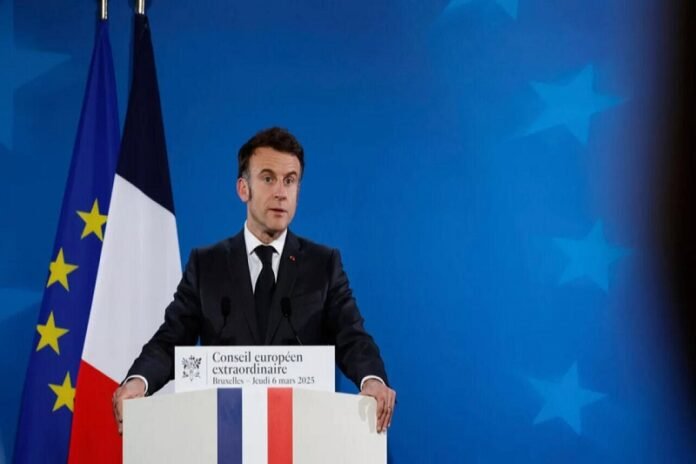In a move described as historic by some and controversial by others, French President Emmanuel Macron announced that his country will officially recognize the State of Palestine during the United Nations General Assembly next September. This announcement, made at a time of great regional and international complexity, raises several questions: are we witnessing a real repositioning of France in the Middle East, or merely a symbolic gesture in the face of the West’s deepening failure to manage the Israeli-Palestinian conflict?
Fidèle à son engagement historique pour une paix juste et durable au Proche-Orient, j’ai décidé que la France reconnaîtra l’État de Palestine.
J’en ferai l’annonce solennelle à l’Assemblée générale des Nations unies, au mois de septembre prochain.… pic.twitter.com/7yQLkqoFWC
— Emmanuel Macron (@EmmanuelMacron) July 24, 2025
Symbolic recognition… and the crisis of lost legitimacy
From the standpoint of international law, recognizing the State of Palestine is nothing new—more than 140 countries have done so, according to UN statistics. However, France’s recognition carries particular weight, as it would be the first major Western nuclear power to take such a step. It offers long-awaited diplomatic momentum for the Palestinian cause.
Yet the paradox lies in the fact that this recognition comes amid a paralysis of the international community and the loss of any real leverage over Israel. What is the point of recognition if facts on the ground are moving in the opposite direction—with rising settlement activity, entrenched occupation, and an unprecedented humanitarian disaster in Gaza and the West Bank?
A shifting European context: from declarations to real initiatives?
The French announcement was accompanied by statements from UK Prime Minister Keir Starmer, who described the situation in Gaza as “catastrophic and indefensible,” and announced emergency talks with Berlin and Paris to discuss a ceasefire and ensure the delivery of aid. He also hinted that a ceasefire might pave the way for Palestinian statehood recognition.
This apparent European harmony may signal the beginning of a shift in Western policy—one that has long been held hostage by the “American veto” and Israeli internal balances. However, a wide gap still exists between rhetoric and action, especially given Europe’s weak political will to impose serious conditions or sanctions on the Israeli occupation.
Reactions: A sharp divide between legality and ideology
The Israeli response, by contrast, was defiant and inflammatory. Deputy Prime Minister Yariv Levin called the French decision “direct support for terrorism,” while far-right Finance Minister Bezalel Smotrich called for an “immediate response by annexing the West Bank.” Once again, the rhetoric of terrorism is being used to legitimize unilateral expansionist steps, in blatant disregard of international law.
This Israeli discourse reveals a deep contradiction: on the one hand, Israel demands international recognition as a democracy that respects the law; on the other, it rejects any recognition of Palestine while continuing to impose colonial facts on the ground.
Macron between domestic pressure and regional bets
France’s decision cannot be separated from overlapping internal and external pressures. Domestically, Macron faces harsh criticism from the left and Muslim communities for his “hesitant” stance on the aggression in Gaza. Internationally, France’s positions in Africa and the Middle East have drawn criticism, with the country seen as an unreliable partner.
According to Palestinian official Hussein al-Sheikh, Saudi Arabia played a role in pushing France toward this decision—suggesting a new Arab-Western convergence on recognition, perhaps as an alternative to the two-state solution now buried under the rubble of Gaza and the West Bank.
Gaza’s tragedy: human backdrop or political instrument?
France’s decision cannot be detached from the worsening tragedy in Gaza: over 59,000 people killed—mostly women and children—according to Gaza’s Health Ministry, compared to 1,219 Israelis killed in the October 7 attack. With 70% of infrastructure destroyed and famine spreading, European governments have begun reconsidering their “unconditional” support for Israel.
But do these tragedies serve as a true catalyst for policy change, or are they merely a card used by Western powers to restore their moral standing in the region?
Conclusion: Recognition is not the end… but the beginning
Between France’s recognition and Israel’s reaction, the battle seems to have shifted from military fronts to diplomatic symbolism. And although recognizing Palestine does not immediately alter legal realities, it does impose a new balance in the realm of legitimacy.
The major question remains: will France be able to translate this political stance into practical legal commitment? Or will it remain trapped within European and American balances?
In either case, a psychological and diplomatic barrier has been broken—and the coming days will reveal whether this is a historic turning point or yet another illusion of “symbolic peace.”


